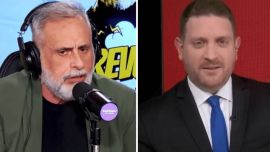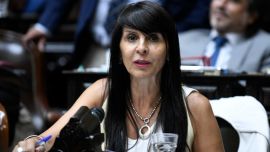President Alberto Fernández on Friday signed a decree that paves the way for the arrival of Covid-19 vaccines manufactured by US pharmaceutical firms Pfizer, Moderna and Johnson & Johnson.
After months of fierce opposition criticism over the lack of shots purchased from US laboratories, the government’s move to alter Argentina’s existing Vaccine Law – passed by Congress last November – smoothes the arrival of mRNA shots manufactured in North America.
"The decree seeks to acquire paediatric vaccines and broadens the spectrum for the vaccination plan," Legal & Technical Secretary Vilma Ibarra confirmed Friday, speaking at a press conference.
Such a move is necessary “to reconcile the needs of the laboratories with the interests of the nation," added Ibarra, who said the text of the Decree of Necessity and Urgency (DNU) had been drawn up following "difficult" negotiations with the laboratories in question.
The new norm creates a Covid-19 Reparation Fund to cover compensation for any person adversely affected by a vaccine. Ibarra explained that it is "a mechanism which exists in many countries around the world, bring calm to contracts."
Regarding the immunity of state assets, state royalties and private state assets will not be immune but all the sovereign assets as defined by the Law to Restore Debt Sustainability will be considered sovereign.
Briefed
Sources from the national government had initially briefed several news outlets on Thursday night about the decree, saying that it would modify existing legislation regulating the purchase and acquisition of Covid-19 vaccines.
Later that evening, Cabinet Chief Santiago Cafiero appeared on local television, explaining why the government had resorted to a decree.
“What we’re evaluating and the president has been specifically involved in is whether there exists a regulatory difficulty that he can resolve,” he said. Some labs “require different regulations and because of that, the president is looking at how to resolve it in a different way and advance with those contracts.”
The president’s decree alters contentious parts of the text that have led to stumbling points in negotiations with the firms. Previous reports by several outlets say that talks with Pfizer, in particular, stumbled over the word “negligence” and its potential interpretation.
"There was an impossibility of contracting [Pfizer] within the framework of the law that Congress passed," said Ibarra on Friday, flanked by Health Minister Carla Vizzotti.
It remains unclear why the government has adopted this path now. The news emerged late Thursday, hours after the ruling coalition’s bloc in the lower house Chamber of Deputies refused to discuss an opposition bill to modify the same law.
"The pandemics do not follow the legislative times," offered Ibarra, who said the decision to issue a decree was taken to avoid the "long process" of a new bill, which would have to pass through committee stage and debate in both houses of Congress.
Unlock negotiations
Ibarra said Friday that the decree would unlock negotiations with firms including Pfizer, which got bogged down despite Argentina participating in Phase III trials of the firm’s vaccine with groups of volunteers. She said the government was keen to secure as many doses of shots as possible.
Following the decree "we want to advance as soon as possible in the contracts that can be signed," said the government official.
Initial reports Thursday said that the Casa Rosada is seeking to find a way to vaccinate children under the age of 18 who have health conditions. Pfizer’s shot is the only one of its kind currently approved for those aged 12 to 18, unlike Sputnik V, Sinopharm and AstraZeneca and last week, at-risk youngsters demonstrated outside Congress to demand access to shots.
Vizzotti confirmed Friday that while Pfizer is approved overseas for youngsters, it is not yet authorised for use on children as yet, though she said several local studies involving adolescents and vaccines were underway.
"We are looking forward to having information for children and adolescents in the short term," said the minister.
Buenos Aires City Health Minister Fernán Quirós, commenting on the news on Friday morning, said the decree would be a positive development.
"It is very important to have access to the greatest number and variety of vaccines possible, so having a legal instrument that allows access to vaccines that we are not able to access today seems to be extremely relevant, especially vaccines that are approved for adolescents,” he said.
Dire moment
Signs of progress in the negotiations come at a dire moment for Argentina, which is edging closer to 100,000 deaths and ranks among the top 15 worldwide in deaths per million. Unable to broker agreements with US vaccine manufacturers to date, Argentina has relied on a mix of Russia’s Sputnik V vaccine, China’s Sinopharm shot and AstraZeneca.
The government has kept strict lockdown measures in place as cases and deaths mount, most recently limiting the entry of travellers from international flights to just 600 people per day.
Fernández has prioritised getting citizens their first dose over ensuring they are fully vaccinated. About 38 percent of Argentines have received one dose, while only nine percent have two doses, according to data compiled by Bloomberg.
The United States government has recently stepped up vaccine donations in Latin America, and has announced it would donate to Argentina too. Brazil, Colombia, Peru and Ecuador have received US donations of either Johnson & Johnson or Pfizer.
Argentina’s government is also in talks with the World Bank to receive financial support for the purchase of more vaccines, it was confirmed Friday. Earlier this week, representatives from the multilateral lender and vaccine producer Moderna met with government officials to discuss legal contracts for the possible supply of its vaccine.
Neither the Moderna or the Johnson & Johnson vaccines are yet approved in Argentina for emergency use.
Fernández’s government has been at odds with Pfizer for several months over an indemnity clause in a law the government passed last year. Former health minister Ginés González García called Pfizer’s demands “unacceptable” last December, without detailing the exact issue, amid reports that the US pharma giant had requested sovereign assets be put up as collateral against any future legal action.
Leaders of the Juntos por el Cambio opposition coalition have heaped criticism for not striking a deal with US producers before the country’s worst wave of Covid cases arrived in April.
The existing legal framework to purchase vaccines, which was voted on by Congress back in November, was approved even before vaccines were authorised, and the lessons of the past few months give the government “the authority to now weigh whether the current framework needs to be modified,” Cafiero said on Thursday. “The president will make the decision with the need for more vaccines at the top of his mind.”
– TIMES/NA/PERFIL





















Comments